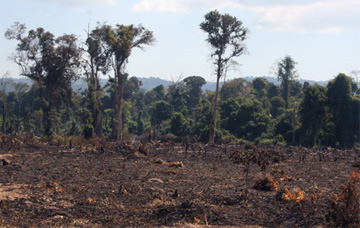|
|
A new UK government-sponsored initiative seeks to address the demand side of deforestation by identifying how an organization’s activities and supply chains contribute to forest destruction.
The initiative, called the Forest Footprint Disclosure Project (FFD Project), will ask companies to “disclose how their operations and supply chains are impacting forests worldwide, and what is being done to manage those impacts responsibly.”
The disclosure information will be reported on an annual basis, enabling investors to identify possible risks related to a company’s “forest footprint.” Disclosure will also provide consumers with information to make better informed decisions about the products they purchase.
 Photo by Rhett Butler |
Participation in the project is free, but companies will have to cover the cost of providing supply chain information. The scheme is modeled after the Carbon Disclosure Project, which asks companies to detail carbon emissions throughout their supply chain.
Today’s unveiling of the project comes just two weeks after some of the world’s largest consumer products brands were scandalized by a Greenpeace report that linked their suppliers to illegal Amazon deforestation. Greenpeace tracked beef and leather produced on Amazon rainforest lands through the supply chain to Brazilian cattle companies which provide raw materials to the likes of Nike, Toyota, Ikea, and others. Several companies—including Wal-Mart, Carrefour and Pão de Açúcar—have already suspended contracts with tainted suppliers, while the World Bank has revoked a loan to to Brazilian cattle giant Bertin.
The FFD Project aims to help companies avoid such surprises in the future.
“[Participating companies] will also gain a better understanding of their own environmental dependencies, and how the changing climate and new regulatory frameworks could affect access to resources and the cost of doing business in the long term,” stated the FFD Project website.
Twelve major financial companies with assets of over $1.3 trillion have already agreed to participate. Invitations to participate will be sent to some 200 companies with a “high potential forest footprint.”
Deforestation on a global scale
Controlling deforestation is imperative to addressing climate change. The annual destruction of 13 million hectares of forest accounts for nearly one-fifth of global greenhouse gas emissions, a greater share than all the world’s trucks, cars, ships, and airplanes combined.
While net forest loss has remained relatively constant over the past twenty years, there have been two significant shifts since the late 1980s: (1) old-growth forests are being replaced by plantations and degraded, logged-over forests; and (2) forest clearing is increasingly driven by industry rather than subsistence activities.
Forest Footprint Disclosure Project
Related articles
Wal-Mart bans beef illegally produced in the Amazon rainforest

(06/12/2009) Brazil’s three largest supermarket chains, Wal-Mart, Carrefour and Pão de Açúcar, will suspend contracts with suppliers found to be involved in Amazon deforestation, reports O Globo. The decision, announced at a meeting of the Brazilian Association of Supermarkets (Abras) this week, comes less than two weeks after Greenpeace’s exposé of the Amazon cattle industry. The report, titled Slaughtering the Amazon, linked some of the world’s most prominent brands — including Nike, Toyota, Carrefour, Wal-Mart, and Johnson & Johnson, among dozens of others — to destruction of the Amazon rainforest for cattle pasture.
Nike, Unilever, Burger King, IKEA may unwittingly contribute to Amazon destruction, says Greenpeace

(06/01/2009) Major international companies are unwittingly driving the deforestation of the Amazon rainforest through their purchases of leather, beef and other products supplied from the Brazil cattle industry, alleges a new report from Greenpeace. The report, Slaughtering the Amazon, is based on a three-year undercover investigation of the Brazilian cattle industry, which accounts for 80 percent of Amazon deforestation and roughly 14 percent of the world’s annual forest loss. Greenpeace found that Brazilian beef companies are important suppliers of raw materials used by leading global brands, including Adidas/Reebok, Nike, Carrefour, Eurostar, Unilever, Johnson & Johnson, Toyota, Honda, Gucci, Louis Vuitton, Prada, IKEA, Kraft, Tesco and Wal-Mart, among others.
Shift from poverty-driven to industry-driven deforestation may help conservation
(08/06/2008) A shift from poverty-driven deforestation to industry-driven deforestation in the tropics may offer new opportunities for forest conservation, argues a new paper published in the journal Trends in Evolution & Ecology.
Corporations become prime driver of deforestation, providing clear target for environmentalists
(08/05/2008) The major drivers of tropical deforestation have changed in recent decades. According to a forthcoming article, deforestation has shifted from poverty-driven subsistence farming to major corporations razing forests for large-scale projects in mining, logging, oil and gas development, and agriculture. While this change makes many scientists and conservationists uneasy, it may allow for more effective action against deforestation. Rhett A. Butler of Mongabay.com, a leading environmental science website focusing on tropical forests, and William F. Laurance of the Smithsonian Tropical Research Institute in Panama believe that the shift to deforestation by large corporations gives environmentalists and concerned governments a clear, identifiable target that may prove more responsive to environmental concerns.